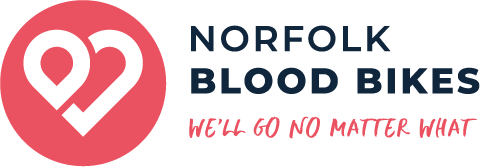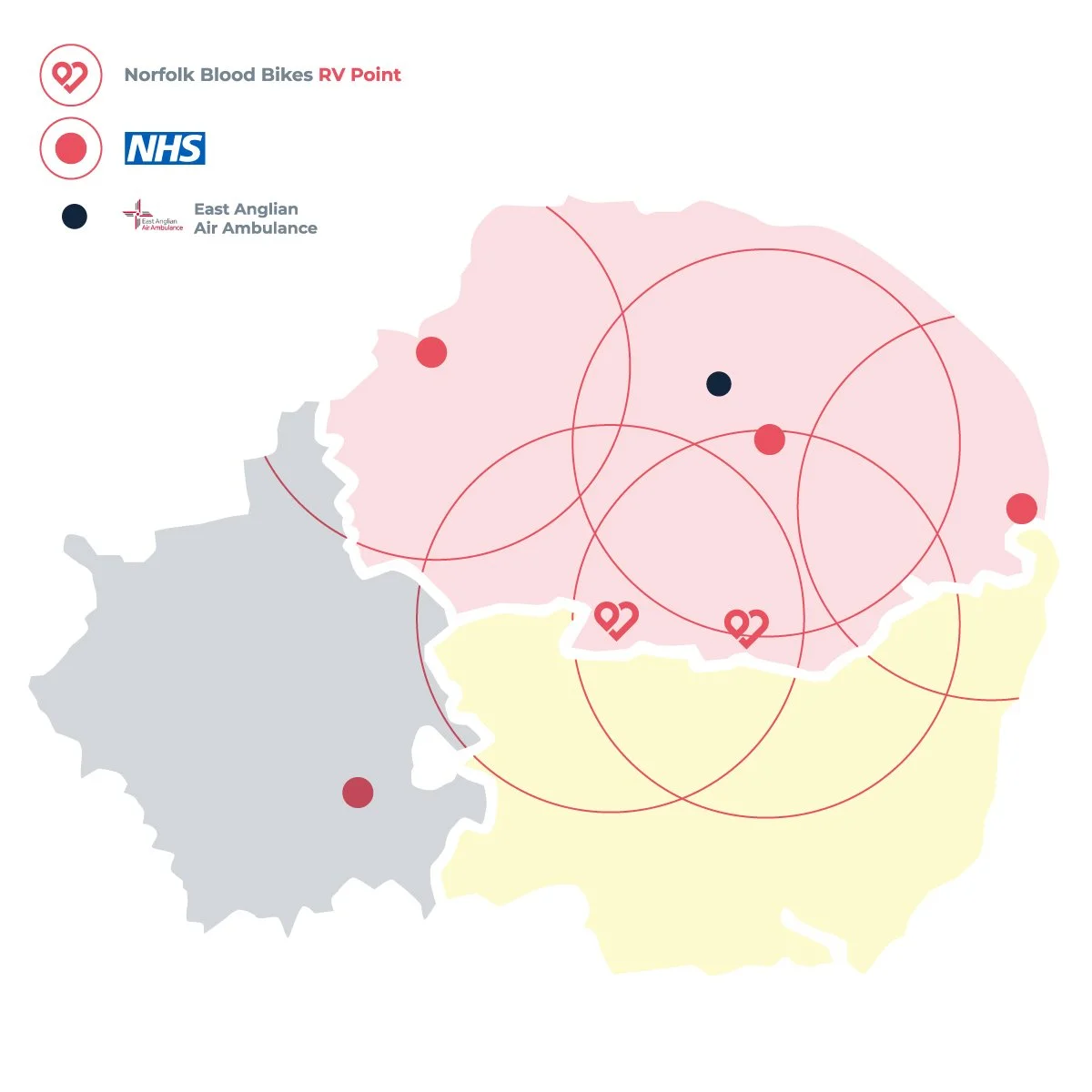How we operate
Making sure each precious item gets to its destination safely and quickly is our bread and butter “business” and we have never missed a beat since we started in 2011.
It's all about team work
There are many moving parts to the operation. Hear from the team members themselves about what Norfolk Blood Bikes means to them and how their contribution helps keep the wheels turning and makes a positive difference to the people of Norfolk.
Our mobile network
With a county as large as Norfolk and the 3 primary Hospitals spread across it, it's not feasible for all members to be able to service all the locations efficiently. Therefore dependent upon where the member lives they are placed within one of 5 Operational Groups:
West Norfolk serving the Queen Elizabeth Hospital (QEH) in Kings Lynn.
In addition this team will also service Chatterton HouseCentral Norfolk serving the Norfolk & Norwich University Hospital (NNUH). This team will also provide coverage for Hellesdon and Julien Hospitals as well as the crucial nightly deliveries of fresh blood supply to the East Anglian Air Ambulance station at Norwich Airport.
East Norfolk serving the James Paget University Hospital (JUPH). This team will also regularly support Northgate Hospital and Carlton Court.
South Norfolk/Thetford area. This is known as the “Rendezvous Group (RV). Most of the members in this group live too far away from the Primary Hospitals to service them directly. However, they have an essential purpose by ferrying Blood and Blood Products from Addenbrookes Hospital to prearranged RV points. These are primarily at Thetford or Scole where they will then pass on the product to a Volunteer from the other team for onward transfer to the requesting Hospital. By utilising the RV rider/driver we can increase efficiency, often using one vehicle to uplift product from the blood banks for multiple hospital locations as well as reducing volunteer fatigue by incorporating shorter individual journeys.
Last, but not least, is the team dedicated to supporting the needs of the Donor Breast Milk network in Norfolk. Picking up at donors homes; transferring donations to the Hearts Milk bank; delivering to hospital neonatal intensive care units; and making deliveries to families within the community. Some of these duties take place during the day time and so this team combine both scheduled “on call” duties as well as “ad-hoc” calls on an as-and-when basis.
It all starts with a phone call
It is easy to focus upon the rider and drivers. However, without a team of trained Controllers ready to receive the calls and task the Volunteers, none of the jobs would get done. Controllers are based at home, so their location within the county is less important than those that need to be close enough to respond quickly. A controllers location may be less important, but their contribution is far from it.
All Riders, Drivers and Controllers are asked to submit their availability a month ahead so a Monthly Rota is produced to ensure that there are 5 drivers/riders and 1 controller for every shift (nights, weekends and Bank Holidays).
There are normally 4 Motorcycles and one car allocated to each team.
A typical shift
Before the shift
Although the shift officially starts at 7pm (9am days) our volunteers still have several jobs to do before that times comes.
The first job our Riders and Drivers have to do is ensure that they collect the vehicle from whoever used it last.
Sometimes this could be from the previous night's volunteer and other times it could be from someone who has used it for a Donated Breast Milk (DBM) run or a fundraiser. Either way it often involves the support of a partner to drive you somewhere so that you can ride, or drive, back.
In some cases this could be a 30 minute drive each way and so the assistance of family and friends is an essential part of being a volunteer for NBB. We really appreciate the support that ennable our volunteers to contribute.
Once they have the vehicle there are number of safety checks to carry out to ensure it is ready for the shift.
In the 30 minutes leading up to the beginning of the shift, the Controller will divert the 'On Call" phone number to their home phone or mobile.
Once this is done they will check the weather and traffic conditions, across the county, and then call each Volunteer in turn.
They will check readiness, mileage of the vehicle and place the Volunteer on call.
During the shift
It is rare that a whole shift goes by without a single call. However, this does occur and so it is deemed perfectly acceptable for all Volunteers to go to bed normally. However, once a Rider/Driver has been mobilised the Controller remains available as they act as a safety contact should anything occur on the road in addition and will call the Hospital to provide updates. If there is any delay in service the Rider/Driver will update the Controller who will then inform the hospital.
The Controller has the capability to track each vehicle, throughout the shift, in real time.
Controller receives call from Hospital via dedicated 0845 number.
Controller Calls relevant Rider/Driver
Rider/Driver reports ETA for collection/RV
Rider/Driver reports safe collection and ETA for delivery
Rider/Driver refuels vehicle
Rider/Driver reports safe arrival at home and ready for next task
Controller completes logs and awaits further calls from Hospitals.
After the shift
Firstly we have to accept that the shift doesn't always finish on time. Quite often a Rider/Driver will be on the road when 7am (5pm day) comes around.
Where this might present a problem e.g. being late for work or an appointment, the Controller will take steps to ensure that the Volunteer's needs are met and the tasks are completed.
Many Riders/Drivers make themselves available for an 'Ad-Hoc' call and will step in, at the last minute, if possible.
This may happen if the 'on shift' Volunteer is unable to complete a task, due to time constraints, or if they have been tasked to an out of area, or longer job and extra cover is needed to 'backfill' any gaps.
Immediately after the shift has finished the Controller will update and submit the logs to enable accurate record keeping.
They will also divert the on call number to the relevant day time contact point.
Once the shifts over the Rider/Driver will refuel the vehicle ready for hand over.
Often this is done during the shift, however sometimes it is not practical due to the rural nature of Norfolk and the distance to an open Fuel Station in the early hours of the morning.
They will complete the logs regarding mileage and refuelling and give the vehicle a check and, if necessary, clean it ready to be collected or for the next shift.
All vehicles must be maintained in a 'ready' state and must be available at short notice.


